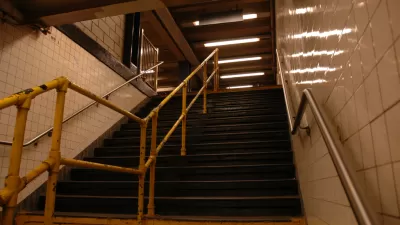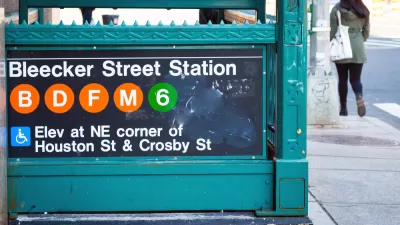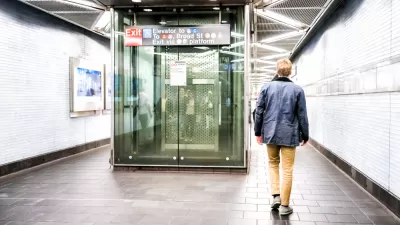It's not enough for buses to be equipped with lifts or unfolding ramps, bus drivers need to know how to operate the ramps and they need to work. Often they don't.
Wheelchair users in New York say they often have trouble getting onto buses even if the buses are capable of accommodating them. One source of problems is the training. While the MTA says all drivers are trained on using the equipment, many disabled riders share anecdotes about having to explain to a driver how the equipment works. To accommodate wheelchair users, drivers need to avoid what's called "curbing," where buses don't pull close enough to the sidewalk for the ramp to reach the curb, which makes boarding impossible for some people who can't get down from the curb into the street.
Often the bus is the primary option for a wheelchair user. "Much of the MTA’s subway system is inaccessible to those who can’t use stairs, with just about 23 percent of its stations equipped with elevators," Jeanmarie Evelly writes for City Limits. When equipment is broken or drivers have trouble accommodating disabled riders, they slow down the trip not only for the disabled person but for everyone else on board.
FULL STORY: City Buses Are Wheelchair-Accessible, But Disabled Riders Still Face Obstacles

Planetizen Federal Action Tracker
A weekly monitor of how Trump’s orders and actions are impacting planners and planning in America.

San Francisco's School District Spent $105M To Build Affordable Housing for Teachers — And That's Just the Beginning
SFUSD joins a growing list of school districts using their land holdings to address housing affordability challenges faced by their own employees.

The Tiny, Adorable $7,000 Car Turning Japan Onto EVs
The single seat Mibot charges from a regular plug as quickly as an iPad, and is about half the price of an average EV.

With Protected Lanes, 460% More People Commute by Bike
For those needing more ammo, more data proving what we already knew is here.

In More Metros Than You’d Think, Suburbs are Now More Expensive Than the City
If you're moving to the burbs to save on square footage, data shows you should think again.

The States Losing Rural Delivery Rooms at an Alarming Pace
In some states, as few as 9% of rural hospitals still deliver babies. As a result, rising pre-term births, no adequate pre-term care and "harrowing" close calls are a growing reality.
Urban Design for Planners 1: Software Tools
This six-course series explores essential urban design concepts using open source software and equips planners with the tools they need to participate fully in the urban design process.
Planning for Universal Design
Learn the tools for implementing Universal Design in planning regulations.
Smith Gee Studio
City of Charlotte
City of Camden Redevelopment Agency
City of Astoria
Transportation Research & Education Center (TREC) at Portland State University
US High Speed Rail Association
City of Camden Redevelopment Agency
Municipality of Princeton (NJ)





























